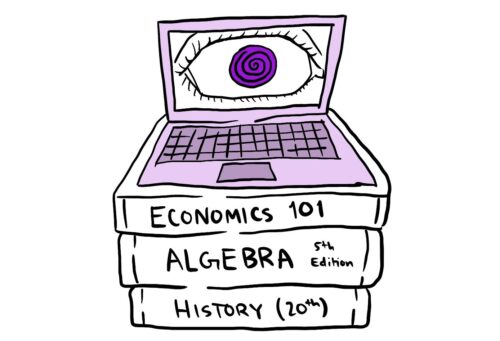With the fall semester taking off, most Harvard students are doing their best to set good habits and regular routines. Starting the year off strong can be crucial to succeeding academically and promoting a healthy work-life balance. Being a Harvard student often means racing against the clock, playing a game to add as many responsibilities as possible and see how much we can add to our plates. After all, attending class is only a small part of the day; most students have work, extracurriculars, sports, meetings, and more. For many, limiting one’s personal usage of technology is key to being productive, staying on task, and getting a nearly impossible number of things done.
Social media in particular often feels like an unbeatable evil, despite using all the tricks in the book: Do Not Disturb mode, time limits, and even deleting apps. The benefits of limiting social media are well known; according to a study from the University of California, Irvine, it takes an average of 23 minutes to refocus on a task after being interrupted.
But, what about other technology-related distractions? Do other forms of technology have an unrealized impact on our productivity? Many professors at Harvard seem to think so. As a result, some classrooms and lectures have begun discouraging, or even prohibiting, the use of electronics.
The ECON 10 series, taught by Professors David Laibson and Jason Furman, is one Harvard course in which in-class electronics use is discouraged, according to the syllabi for the classes. A section titled “Electronics in the Classroom” reads, “We will print paper copies of the slides for each lecture and strongly encourage you to try taking notes on these slides. Research shows that the use of laptops and tablets in the classroom has, on average, a negative impact on learning.”
Although electronic devices are not prohibited, the ECON 10 professors do encourage students using them to sit towards the back, and with good reason. The ECON 10A syllabus states, “We ask that…you be considerate of the distraction your device use may create for those sitting near you…If you choose to use a laptop or tablet, we ask that you sit near the back of a section to minimize distractions for students sitting behind you.” A 2017 York and McMaster study confirms the distracting nature of in-class technology use. “Students who could see the screen of a multitasker’s laptop (but were not multitasking themselves) scored 17 percent lower on comprehension than those who had no distracting view,” the study states.
The Independent interviewed Professor David Laibson on the ECON 10 series technology policy. “For some students [laptops are] a great technology… For other students it is a gateway to distraction (you are one click away from everything that is not class relevant),” he said. Laibson also referenced a study conducted at West Point that he shows students in one of his ECON 10 lectures, in which “randomization to access or non-access (of electronic devices) yields an 11 percentage point difference in percentile course performance among those students who have access to electronic devices.”
Laibson’s discussion aligns with various studies that have been conducted on the topic of in-class laptop use. One study at the United States Military Academy found that “average final exam scores among students assigned to classrooms that allowed computers were 0.18 standard deviations lower than exam scores of students in classrooms that prohibited computers.”
Despite the pains of taking notes by hand, the benefits to leaving laptops out of lecture halls seem monumental. Researchers at the University of Michigan corroborate that laptop use has a negative correlation with academic performance. According to the study, in one hundred minutes of class, students with laptops spend an average of about forty minutes using the internet for nonacademic purposes. Additionally, the research finds that students with laptops also spent an average of five minutes or less looking at syllabi and other class-related material on the internet. These statistics confirm that laptops are not essential to classroom learning and that other methods of note-taking or studying are both more efficient and less distracting.
This realization is essential to promoting productivity and information retention. The impacts of technology go far beyond whether our professors prohibit it, but also hinder our own ability to focus and remain successful. As Harvard students, we owe it to ourselves to try proven avenues that ensure our wellbeing and allow us to go through our everyday lives efficiently.
These hidden distractions are often deceptive, created because students believe their technology will be more helpful than harmful. Clearly, successfully beating these distractions is a matter of limiting our own access to technology. However, that is not a simple task, especially because of the speed and convenience that laptops provide in class. As Laibson mentioned, the tempting benefits include “better note taking and real-time access to relevant material on the web, like definitions.” Also, when class materials are located on the internet, access to those relevant materials becomes entangled with a direct path to distracting sites.
The distractions imposed by technology do not just affect Harvard students; they are pervasive in academic environments worldwide. The impact of technology on our focus, concentration, and productivity might not be fully avoidable, but surely work can be done towards lessening distractions by setting barriers against technology-related distractions. Next time you are sitting in lecture, think twice about pulling out the laptop, and opt for pen and paper instead.
Abril Rodriguez Diaz ʼ26 (abrilrodriguezdiaz@college.harvard.edu) struggled to use her laptop only for its intended purpose while writing this article.

